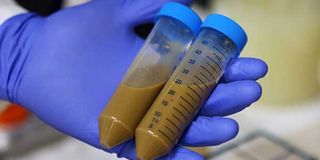Poop to the rescue (yuck!)

Faecal matter from a healthy individual can be introduced — or ‘transpoosed’ into the gut of sickly person in two ways; through a colonoscopy after blending it, or via pills. PHOTO | FILE
What you need to know:
- Researchers say the faecal matter of a healthy individual, when ‘transpoosed’ into the gut of malnourished children, aids in the growth of the right, friendly bacteria.
- So the body just makes sure the ‘devils’’ population is in a manageable number that the ‘angels’ can beat to submission should they get adventurous.
- A tiny drop of stool has hundreds of billions of ‘devils’ and ‘angels’, hundreds of millions of viruses, and hundreds of millions of spores of fungi.
For a long time, it was believed that the negative physical and intellectual consequences of malnutrition on children cannot be reversed, until research discovered the benefits of — wait for it — poop!
Yes, human faecal matter!
A study has shown that faecal matter from a healthy human being can be transplanted — a process called faecal microbiota transplantation, or simply ‘transpoosion’ — into the gut of a malnourished child to help the affected child process food.
As expected, the study has triggered the debate on whether malnourishment is all about food, or lack thereof, and also the importance of the community of the trillions of gut bacteria, collectively called microbiota.
Microbiologist Sam Kariuki of the Kenya Medical Research Institute(Kemri) says gut bacteria is essential to human health as it serves several protective, structural, and metabolic functions in the host.
And in a study published in the journal Science in 2016, US microbiologist Jeffrey Gordon and his team sampled pairs of twins who had developed different strains of kwashiokor — a form of malnourishment— as well as healthy ones.
Both healthy and malnourished twins were fed on “ready-to-use therapeutic food” (RUTF), which is a mixture of milk, ground peanuts, sugars, and vegetable oil, and is usually used as treatment for malnutrition
When a twin with kwashiorkor began receiving RUTF, the healthy twin received it, too.
STUNTED MICROBIOTA
Dr Gordon and his team observed changes in the microbiota: there were several changes in the gut bacteria in the healthy children but none was observed in the undernourished children, indicating that the microbiota growth was stunted.
The researchers then took the poop of both the healthy and sickly children and transplanted it into mice that had no microbes, were fed on distilled water and food, and lived in isolated boxes with filtered air.
After “transpoosing” the mice with poop from the healthy and the malnourished children, the animals ate food that was identical to that consumed in rural Malawi, and alas, the rats that got poop from undernourished children thinned, even though they were feeding on the same food as the mice that got poop from the healthy rats!
Gordon and his colleagues argued that bacteria living in a child’s gut protects the child from malnutrition and allows him or her to consume and absorb breast milk, which has sialic acid crucial for brain development.
A well-nourished child has resilient microbiota that changes over time, interrupted by disease and treatment, but starvation disrupts the development of these bacteria.
The interest in human microbiome, and particularly faecal transplantation, is not a new topic in the science community.
Dr Alan Rajula, an expert in the diseases of the gastrointestinal tract and liver, says faecal matter has been packed into pills in the developed world to treat Clostridium difficile, an infection of the gut.
Prof Kariuki, the microbiologist at Kemri, says Clostridium difficile affects the elderly or those who have been on antibiotics — as antibiotics clear the good bacteria that protect the gastrointestinal tract and allows the harmful bacterial such as Escherichia coli to take over.
DEVILS AND ANGELS
Dr Rajula says that the healthy donor is screened for several diseases such as Hepatitis B before the faecal matter administered to the sick patient in either of two methods.
“There is a blender for the faecal matter which is introduced to the body through a pipe (colonoscopy), or the pill”.
So why and how does the poop — yuck! — of a healthy human being cure one sickly of C. difficile… or any of these other gut problems?
Imagine a field of devils (bacteria with potential to harm) and angels (the good bacteria) that have nowhere to live except a boat in the gut.
The devils — of which C. difficile is one of — cannot be killed from their side of the boat because without them the boat would topple over.
So the body just makes sure the ‘devils’’ population is in a manageable number that the ‘angels’ can beat to submission should they get adventurous.
A tiny drop of stool has hundreds of billions of ‘devils’ and ‘angels’, hundreds of millions of viruses, and hundreds of millions of spores of fungi.
However, when a person gets sick and takes medication, the antibiotics get rid of the disease-causing devils and sometimes kills the angels as well.
When the angels die out, the devils get the opportunity to reign in the gut, and in their evil nature, they produce chemicals and poisons that are responsible for the frequent diarrhoea. Since patients pick up the aggressive forms of C. difficile from hospitals, it is usually resistant to conventional antibiotics, leaving faecal transplant as the only option to save patient.



